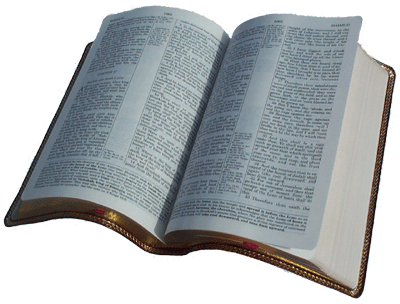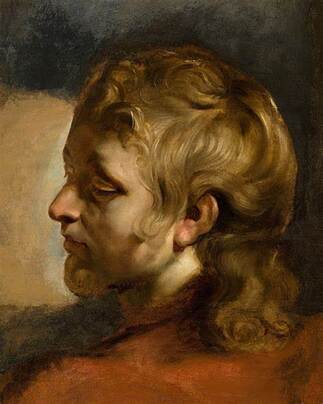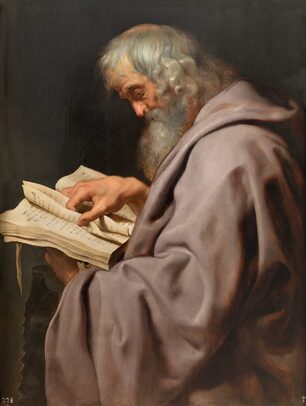Galatians 2:1-10 Lesson 360
Read both the "King James Bible" and the "New Living Translation."
In this lesson:
The Council of Jerusalem approves.
In chapter one, we learned how Paul's teachings came from God.
Now, the church leaders give their approval.
John and Barnabas.
By the Flemish baroque artist Sir Peter Paul Rubens (1577-1640).
By the Flemish baroque artist Sir Peter Paul Rubens (1577-1640).
Who was...
Barnabas -
Barnabas (meaning "the encourager" or "the son of consolation") is a nickname for Joses (Joseph). Barnabas was a Jewish Levite (the tribe of Levi) from Cyprus (Acts 4:36). He was John Mark's cousin (Colossians 4:10), an important early Christian, and the first believer to support Paul. When the apostles doubted the sincerity of Paul's conversion, Barnabas convinced them that Paul's faith was genuine (Acts 9:26-27). "A good man, and full of the Holy Ghost and of faith" (Acts 11:24), Barnabas sold his land and donated the proceeds to the church (Acts 4:37). Barnabas and his cousin John Mark traveled with Paul on the first missionary journey. A rift developed between Barnabas and Paul (Acts 15:36-41) when Mark left the mission and returned to Jerusalem (Acts 13:13). Barnabas and Mark then traveled to Cyprus without Paul (Acts 15:39). Mark and Barnabas eventually reconciled with Paul. Mark was in Rome with Paul when he was imprisoned (Colossians 4:10), and Barnabas worked with him for a year in Antioch, teaching and building the church (Acts 11:25-26). When a famine struck the Roman empire, Barnabas helped Paul bring "relief" to Judea (Acts 11:29-30).
Titus -
A Greek (Galatians 2:3) from Nicopolis of Macedonia, Titus was a Christian and a "partner" and "helper" to Paul (2 Corinthians 8:23). Titus traveled with Paul on several of his missionary journeys, helped him establish and organize churches, collected donations for the poor of Jerusalem (2 Corinthians 8:3-6; 12:18), and accompanied Paul to the council at Jerusalem (Galatians 2:1). Paul described Titus as a source of comfort during his many tribulations (2 Corinthians 7:6). Titus delivered "The Second Epistle to the Corinthians" to Corinth and helped Paul with his evangelical work there. Some Bible scholars believe Titus also carried "The First Epistle to the Corinthians" to Corinth. Titus was like a son to Paul (Titus 1:4), and they traveled together to the island of Crete, spreading the Gospel. When Paul left Crete, Titus stayed behind to organize and expand the church (Titus 1:5). Paul wrote "The Epistle Of Paul The Apostle To Titus" to guide and encourage him as he built the Crete churches. Tradition has it that Titus became the first bishop of Crete and died there at an old age. Heraklion, the capital of Crete, claims to be Titus' burial place.
Cephas -
Aramaic for Peter, Cephas is a surname given by Christ to His apostle Simon Peter meaning rock" (John 1:42). The Greek translation is Petros, and the Latin is Petrus. See lesson 359 for more information.
John -
One of the original twelve disciples, John was the son of Zebedee (Matthew 4:21-22; Mark 1:19-20; 10:35; Luke 5:10-11) and Salome, the younger brother to the disciple James (Matthew 10:2), and a fisherman on the sea of Galilee when called by Jesus. John's mother Salome and the Virgin Mary were sisters, making Jesus and John cousins. John was a Jew, born in Palestine (Bethsaida) into a wealthy family, was well connected, and knew the high priest (John 18:15). He first learned about Jesus from John the Baptist. He captained a fishing boat on the Sea of Galilee but gave up everything he had to follow the Messiah. Jesus nicknamed John and his brother James the "Sons of Thunder" (Mark 3:17), and John 13:23, 19:26, 20:2, 21:7, and 21:20 refer to him as "the disciple whom Jesus loved," quite an honor. Along with Peter and James, John was part of Jesus' inner circle. He was allowed to witness the resurrection of Jairus' daughter (Mark 5:37-42), the Transfiguration (Mark 9:1-13; Luke 9:28-36), and Jesus praying in Gethsemane while waiting to be arrested (Mark 14:32-34). Unlike the other disciples who ran and hid after Jesus was arrested, John followed Christ to Calvary, witnessed the crucifixion, and stayed by Jesus' side until the end. While dying on the cross, Jesus entrusted His mother's care to John (John 19:26-27). It is believed that Mary lived and traveled with John until her death. After the crucifixion, John became a driving force for Christianity. Bold yet uneducated (Acts 4:13), John wrote "The Gospel According to ST. John," the Three Epistles of John, and the prophetic "The Revelation of John the Divine." Late in his life, the Romans exiled John to the island of Patmos, a penal colony in the Aegean Sea fifty miles offshore from Ephesus (in modern-day Turkey), for preaching the word of God (Revelation 1:9). He was eventually freed and died an old man around AD 98 in Ephesus. But what a life John led. He traveled with Jesus, saw the miracles, heard the sermons, and witnessed the suffering, crucifixion, death, resurrection, and ascension. He was the last of the twelve disciples to die and the only one to die a natural death.
Barnabas -
Barnabas (meaning "the encourager" or "the son of consolation") is a nickname for Joses (Joseph). Barnabas was a Jewish Levite (the tribe of Levi) from Cyprus (Acts 4:36). He was John Mark's cousin (Colossians 4:10), an important early Christian, and the first believer to support Paul. When the apostles doubted the sincerity of Paul's conversion, Barnabas convinced them that Paul's faith was genuine (Acts 9:26-27). "A good man, and full of the Holy Ghost and of faith" (Acts 11:24), Barnabas sold his land and donated the proceeds to the church (Acts 4:37). Barnabas and his cousin John Mark traveled with Paul on the first missionary journey. A rift developed between Barnabas and Paul (Acts 15:36-41) when Mark left the mission and returned to Jerusalem (Acts 13:13). Barnabas and Mark then traveled to Cyprus without Paul (Acts 15:39). Mark and Barnabas eventually reconciled with Paul. Mark was in Rome with Paul when he was imprisoned (Colossians 4:10), and Barnabas worked with him for a year in Antioch, teaching and building the church (Acts 11:25-26). When a famine struck the Roman empire, Barnabas helped Paul bring "relief" to Judea (Acts 11:29-30).
Titus -
A Greek (Galatians 2:3) from Nicopolis of Macedonia, Titus was a Christian and a "partner" and "helper" to Paul (2 Corinthians 8:23). Titus traveled with Paul on several of his missionary journeys, helped him establish and organize churches, collected donations for the poor of Jerusalem (2 Corinthians 8:3-6; 12:18), and accompanied Paul to the council at Jerusalem (Galatians 2:1). Paul described Titus as a source of comfort during his many tribulations (2 Corinthians 7:6). Titus delivered "The Second Epistle to the Corinthians" to Corinth and helped Paul with his evangelical work there. Some Bible scholars believe Titus also carried "The First Epistle to the Corinthians" to Corinth. Titus was like a son to Paul (Titus 1:4), and they traveled together to the island of Crete, spreading the Gospel. When Paul left Crete, Titus stayed behind to organize and expand the church (Titus 1:5). Paul wrote "The Epistle Of Paul The Apostle To Titus" to guide and encourage him as he built the Crete churches. Tradition has it that Titus became the first bishop of Crete and died there at an old age. Heraklion, the capital of Crete, claims to be Titus' burial place.
Cephas -
Aramaic for Peter, Cephas is a surname given by Christ to His apostle Simon Peter meaning rock" (John 1:42). The Greek translation is Petros, and the Latin is Petrus. See lesson 359 for more information.
John -
One of the original twelve disciples, John was the son of Zebedee (Matthew 4:21-22; Mark 1:19-20; 10:35; Luke 5:10-11) and Salome, the younger brother to the disciple James (Matthew 10:2), and a fisherman on the sea of Galilee when called by Jesus. John's mother Salome and the Virgin Mary were sisters, making Jesus and John cousins. John was a Jew, born in Palestine (Bethsaida) into a wealthy family, was well connected, and knew the high priest (John 18:15). He first learned about Jesus from John the Baptist. He captained a fishing boat on the Sea of Galilee but gave up everything he had to follow the Messiah. Jesus nicknamed John and his brother James the "Sons of Thunder" (Mark 3:17), and John 13:23, 19:26, 20:2, 21:7, and 21:20 refer to him as "the disciple whom Jesus loved," quite an honor. Along with Peter and James, John was part of Jesus' inner circle. He was allowed to witness the resurrection of Jairus' daughter (Mark 5:37-42), the Transfiguration (Mark 9:1-13; Luke 9:28-36), and Jesus praying in Gethsemane while waiting to be arrested (Mark 14:32-34). Unlike the other disciples who ran and hid after Jesus was arrested, John followed Christ to Calvary, witnessed the crucifixion, and stayed by Jesus' side until the end. While dying on the cross, Jesus entrusted His mother's care to John (John 19:26-27). It is believed that Mary lived and traveled with John until her death. After the crucifixion, John became a driving force for Christianity. Bold yet uneducated (Acts 4:13), John wrote "The Gospel According to ST. John," the Three Epistles of John, and the prophetic "The Revelation of John the Divine." Late in his life, the Romans exiled John to the island of Patmos, a penal colony in the Aegean Sea fifty miles offshore from Ephesus (in modern-day Turkey), for preaching the word of God (Revelation 1:9). He was eventually freed and died an old man around AD 98 in Ephesus. But what a life John led. He traveled with Jesus, saw the miracles, heard the sermons, and witnessed the suffering, crucifixion, death, resurrection, and ascension. He was the last of the twelve disciples to die and the only one to die a natural death.
The way to salvation:
First, acknowledge that we have all
sinned and that the penalty is eternal
death. Second, repent and confess that Jesus
is the Son of God who died for our sins and was
resurrected. Lastly, pray and make Jesus a part of your life.
Forgiveness of sins and salvation comes through the Son of God.
First, acknowledge that we have all
sinned and that the penalty is eternal
death. Second, repent and confess that Jesus
is the Son of God who died for our sins and was
resurrected. Lastly, pray and make Jesus a part of your life.
Forgiveness of sins and salvation comes through the Son of God.













